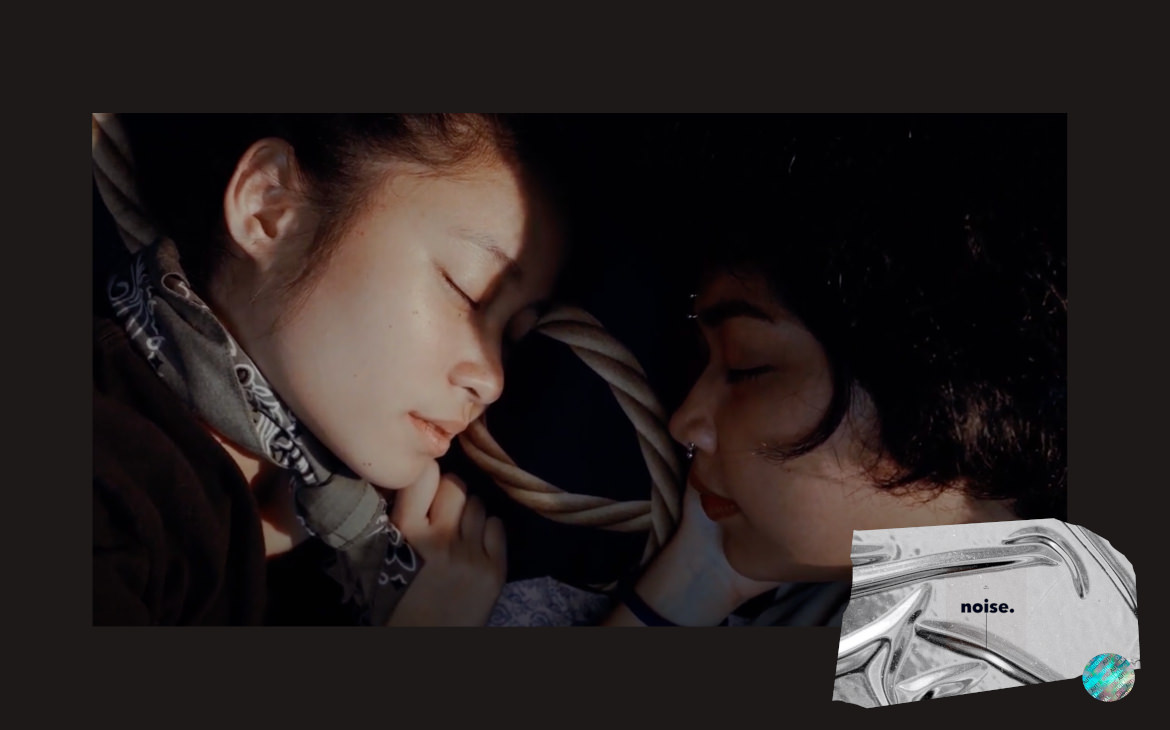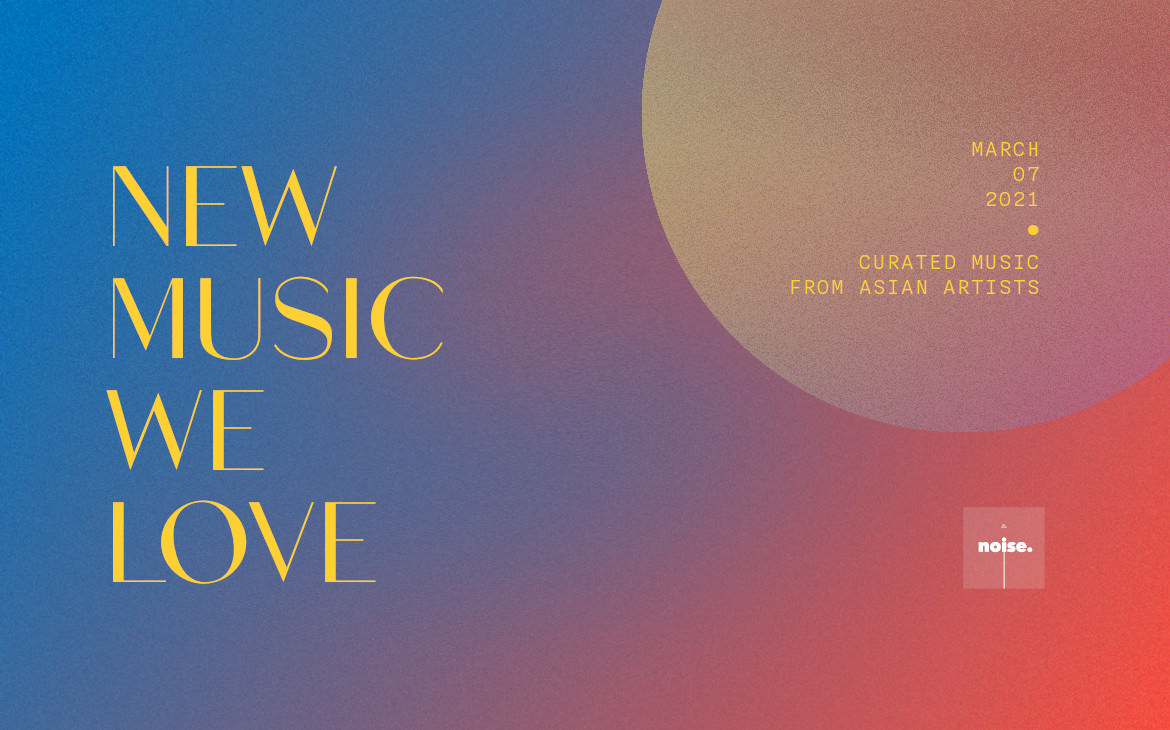By MC Galang and Ian Urrutia
Header Art by MC Galang
We’re back to covering new Asian music on this week’s roundup of New Music We Love.
MC’S PICKS
‘Lost Film’ – Rocketman (TH)
There is undeniable lightness and ease to Thai experimental pop band Rocketman’s “Lost Film.” While plenty of its artistic choices hinge on commercialized nostalgia, there is a pang of bittersweet in its carefree narrative. Whereas the song and video center on romantic yearning, it’s hard to overlook how much “Lost Film” also translates to a greater sense of longing and reacquainting with all that were abruptly put on hold.
It’s a song that’s meant to close the gap between wondering and wandering. It’s essentially a love note that says, “I miss you.” But under these circumstances, it cuts deeper, it weighs heavier.
‘Huyu 冬天’ – Banyan Gang 榕幫 f/ L8ching 雷擎 (TW)
Taiwanese hip-hop group Banyan Gang 榕幫 demonstrates the timelessness of East Coast production, their discography a clear homage to classic New York sound, both in form and style. Their latest album, 春化作用 (Vernalization), crystallizes this influence into their stock-in-trade.
One of its standouts is “Huyu (Winter),” which is about “little things [that] come up on winter nights, like some people that you haven’t talked to in a long time,” rapper Hsien Chan tells The Rest Is Noise. The song features rising Taiwanese R&B singer and drummer, L8ching. “We invited [him] and he nailed the hook at once,” Chan adds.
Director Harrison Chuang shot the music video for “Huyu” in one take, featuring Chan and Ning Huang. “He wanted to present the feeling of coldness and sorrow through me and the actress being in the same room but never interacted with each other.”
Stream on Spotify
‘4EVER EXI(S)TS’ – QUICKTHOT. (PH)
QUICKTHOT.‘s “4EVER EXI(S)TS” is ultimately an exercise in restraint. It doesn’t parlay in flash, but builds a cohesive, rich narrative—one with a beginning, a middle, and an end. It thrives in its quieter moments, giving its kinetic bursts their suitable payoff. It is a smart, intuitive piece of work that understands how the body talks: that less can be more, that restive is not festive, and that impulse can be reined in.
‘ARMI – ‘Di Mo Lang Alam’ – maaliw (PH)
Hearing both Up Dharma Down’s “Oo” and Rihanna’s “We Ride” distinctly, though juxtaposed together, is a delight. While both tracks were released in 2006, there were no other clear similarities between the two. What has been increasingly obvious in the past few years though, is how Armi Millare’s distinctly malleable, often-replicated-but-not-quite-so vocals comfortably and effortlessly fit R&B as much as it does pop-leaning arrangements, if not better (you’re welcome to debate me on this). Electronic producer maaliw latches on that iconic line and runs away with it.
It also reminds me of The Balladeer’s R&B rework years ago of the band’s most popular hit, “Tadhana.” Whether it’s an acoustic guitar with a low-trilling percussion or a velvety 2000s soul jam, electronica musicians have plenty to mine from those golden vocals—and all we can say is, keep them coming.
‘After Storms’ – LUSTBASS (PH)
The title track of Intraverse IV culls hip-hop percussion and R&B stylings to deliver the latter genre’s preoccupation with emotional indulgence—especially evident during R&B’s commercial boom in the ‘80s, which also happened to be widely considered and criticized as its most soulless era.
These tendencies can easily become fully realized with the same lyrical and thematic clichés repeatedly churned out, style overwhelmingly over substance. That is not to say, R&B has to plumb through academic annotations of human emotions in order to validate them or assign “real” value to them. But the way plenty of songs are written right now sounds and feels like they are lousy retellings of other people’s stories and feelings, as opposed to their own: detached and mechanical.
Following LUSTBASS’s work through the years is like mapping desire: visceral, innocuous, and palpable. The latter half of his discography, particularly the Intraverse series, examines desire as part of the human experience and demystifies its role—one that hinges on sex and lust alone—in relationships, including one we have with ourselves. It reclaims autonomy as much as it celebrates union. “After Storms” sweetens the sap of “you will always be my sun after storms” by stating it matter-of-factly and yet it still is tremendously more affecting than any other Shakespearean professions in the Spotify era.
‘Slowed Down’ – Feifei (PH)
“Slowed Down”—written and produced by Feifei (霏) of NOFACE Records—inhabits trip-hop the way so many did before: chronicling the “post-sad” sentiments within the context of gender roles in relationships. Much like the music of DANA BLAZE or Bita and the Botflies, asserting one’s agency is automatically perceived as “being difficult” or lurid sexuality.
Part of her Succubus EP, “Slowed Down” attempts to recontextualize female pleasure away from its almost perpetual association with struggle, if not violence. The familiar plotline of revenge (as popularized by critically acclaimed date movie, Gone Girl) has its own share of problem areas, such as seemingly perpetuating the idea of “scorned woman kills men who wronged her.” While violence begets violence, yes, this fictionalized recounting of ostensibly and tragically real situations simply cannot be sanitized. Also, it cannot be overlooked how these criticisms often come from men, scandalized at the wrong kind of daring: of resolve and not of objectified subservience.
‘Pakisabi’ – WYP (PH)
Another entry on my list this week is the newest from another NOFACE Records signee, WYP, with “Pakisabi” off his new album, Alingaas. WYP shares a Mark Fisher quote on the liner notes: “Writing about one’s own depression is difficult. Depression is partly constituted by a sneering ‘inner’ voice which accuses you of self-indulgence – you aren’t depressed, you’re just feeling sorry for yourself, pull yourself together – and this voice is liable to be triggered by going public about the condition.”
Anchored by hip-hop and alt-R&B production, WYP disarms through his own vulnerability, not by glorifying pain but coursing through trauma. As culture critic Rodney Carmichael notes on another anxiety anthem, “Mind Playing Tricks on Me” by Geto Boys, “Our generation knew how to posture. We knew how to pose and play hard. But the survival tool we’d really been missing all this time was a way to process our pain, to process our reality.” Depression is a beast that lives within and fighting it means wrestling with our own self, jousting with desperation, grief, fear, and anger before even getting through the core of it.
“Pakisabi” does not look for nor prescribe solutions—WYP acknowledges and processes his own depression. And sometimes, that can be everything.
IAN’S PICKS
‘Miss Mosh’ – Shirebound and Busking (PH)
Nobody writes Pinoy love songs like Iego Tan does. His singer-songwriter alter-ego, Shirebound and Busking, defies the hugot rulebook by dredging up the romantic in the ephemeral. His songs are idle conversations or internal monologues stripped to the core: no sorting of residual feelings, no grand metaphors that define love, no promises for the paths to cross again. But what makes it work is the element of kilig that slowly and masterfully unfolds in the process. The charm never dissipates even when he holds back by concealing his intent with irony or sarcasm (“A Million Little Things,” “Waltz Of Four Left Feet”). Without stating the obvious, he makes us want to, sort of, believe in love again.
Shirebound and Busking’s “Miss Mosh” reflects Iego’s flair for the everyday mundane. Seldom do we hear a confessional like this track that is quite uncertain of the act of admission, but takes comfort in writing a song anyway about a girl that happens to catch his fancy, in a mosh pit, of all places. The jangly indie rock verses tend to lean towards complementing the themes of romantic yearning, which reflects that one fateful encounter while driving on his way home. As the song approaches the chorus, everything goes haywire and snot as punk: the mosh pit becomes the narrative’s center stage, and the instrumental breakdown evolves into the main hook, inviting random bodies to smash into each other out of sheer joy and excitement.
Iego subverts the framework of pop music without breaking away from its very essence. He dismantles the structure of what qualifies as a chorus, and writes comfortably from a place of earnestness and experience. And when “Miss Mosh” ends with a quote and translation of a line from Ang Bandang Shirley’s “Nakauwi Na”—the very same song that shares an affinity with Iego’s songwriting style and wit—he somehow rekindles the exact, same feelings in a different timeline, allowing us, listeners to hear the beating of his heart, and maybe the countless others who might have the same story to tell. “Being with you feels like I’m home already,” he sings, bringing smiles to our faces. Without resorting to embracing the promise of forever or capturing the enormity of romance, Shirebound and Busking effortlessly evokes both the nuances and pleasures of young love. He takes us to a journey that feels like the ride of a lifetime.
‘Hotel 65’ – Thud (HK)
Thud’s “Hotel 65” steps out of the familiar by mining sedated hallucinations out of a massively textured sound. Its oscillating noise propels the band’s musical detours with an ecstatic and dense sonic experience. But at the heart of it all is a feminine energy that drifts above the glorious mess, with Kim’s dreamy vocals finding its secured place from across the room. The music still leans on the sound of isolation. The melodies, gorgeous and ghostly, but neither slight nor light. It’s easily one of my favorites from the band’s selection of underrated gems.
‘No Paradise’ – Seventeen Years Old and Berlin Wall (JP)
“No Paradise” is a slightly surprising departure from the Tokyo-based band‘s shoegaze and noise-pop influences. Compared to their previous releases, it’s easier to get lost in their version of a lullaby now: vocalist-guitarist Yusei Tsuruta sings as if she’s whispering to your ears. The song’s swoony melodies breed comfort and sedate you to sleep after. Despite the shift to a more delicate brand of dream pop, Seventeen Years Old and Berlin Wall retains their finely hypnotic sound that in other hands, might have been glossed over with unnecessary production flourishes in an attempt to court accessibility.
‘Headless Discourse’ – Grandi Oso x Child/ren of the Pilgrimage (PH)
Experimental folk artist Grandi Oso teams up with bedroom act Child/ren of the Pilgrimage for Des Demontres, a 7-track EP of avant-garde experiments that convey our experience with forced withdrawal and socio-political anxiety. One of the best cuts in the album is “Headless Discourse,” a sterling mix of noise, ambient music, drone and post-rock sounds, illustrating the pained voices of a nation that’s about to fall apart. It’s a jam that makes your ears ring, and unconsciously converts our normative sense of disgust into an anthem that shelters our collective frustrations and nightmare. It’s surprisingly comforting to a degree to feel the very same things. “Headless Discourse” offers a sense of familiarity.
‘Chorked Up’ – Zagmachi 자그마치 (KR)
It takes gall and brilliance to showcase the messy pitfalls of heartbreak with hook-laden details that fail to inhabit some sort of predictability, especially if you barely have five minutes to explain your work further. The music video of Zagmachi’s K-indie single, “Chorked Up” expertly chronicles the romantic dissolution of a relationship with surprising elements. It presents a familiar scenario: What happens when something so warm and sweet is suddenly thrown into disarray? Would you walk alone, and feel bad at the sight of lovers in the street and strangers playing beautiful romantic music? Would you dance to your heartbreak, and allow people to see it—the misery, the pain, the enveloping animosity? There is beauty in its smallness and simplistic depiction; in two people falling apart, leaving the other person carrying the emotional baggage. Its sting is captured gracefully.
Stream on Apple Music
‘At Night She Pumps’ and ‘Berries’ – Happy Dad (PH)
Happy Dad is the solo indie project of Cheats’s Jim Bacarro, and his musical outlet for songs that he dedicates to his wife Saab and his kids. Today, he drops “Berries” and “A Night She Pumps”—both charming stripped-down numbers that stack emotional resonance without even trying. Both songs eschew soaring instrumentations and anthemic bigness to disassociate itself with Bacarro’s other band, Cheats. Here lies a more subdued progression in terms of production and musical direction; its storytelling confined from a confessional point of view. It’s Jim reassuring the most important people in his life, the unconditional love and care that he promised since day one. It’s an intimate revelation that will surely tug at your heartstrings.






